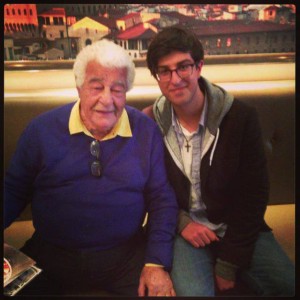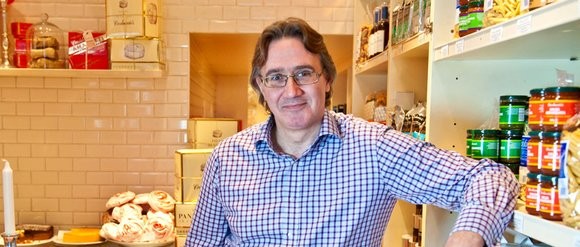The Italian Job: An Interview with Simon Kossoff
Simon Kossoff is the CEO of Carluccio’s, the successful chain of Italian restaurants that recently opened up a branch in our very own Leamington Spa. In this interview, Hari Sethi asks the businessman about the secrets of the brand’s success and the trials and tribulations of surviving in the restaurant business.
Hari Sethi: How has Carluccio’s as a brand managed to prosper during the difficult economic conditions of the past few years?
Simon Kossoff: I think the big issue is value for the customers; value is a funny thing because it’s not a commodity that you can simply measure in price, it’s subjective. Carluccio’s was built upon the philosophy of serving a better product at the same prices as everyone else on the high street. We work hard to convey the value we offer, with a £9.95 two course meal that seems to have gone down very well with our customers. We’ve resisted like mad pushing up out prices, which means we’ve had to absorb some of the costs ourselves and back down the supply chain. But I feel that the most important aspect of how we’ve been able to get through such conditions is that we’ve sought to offer customers, reliability, value and consistency in terms of the products we produce. Following 2008 and the difficult economic conditions that materialised there were lots of predictions that people would stop going out to eat and the restaurant business would suffer as a result. But in fact eating out has become so ingrained in our culture that it proved not be as disposable as unlike the last recession.
HS: In terms of your consistency, I’ve heard that around ¾ of your food is produced fresh in house, how difficult is it to maintain such high levels of consistency throughout your branches?
SK: We follow such methods because we feel we’re able to produce a better product that way and also customers like the feeling that their food is being produced especially for them in branch rather than as part of a mass produced chain. Obviously there are some things that we just don’t have the skill base to produce across 74 regional restaurants, like our pastries, however, we do insist that those companies we employ to make such products ensure that they follow Antonio’s recipes.
HS: In my opinion Carluccio’s has always been able to distinguish itself from the wide array of Italian chain restaurants across the UK, what do you think enables the brand to do so?
SK: Firstly having Antonio’s name associated with our business is something that we’re extremely privileged to be able to utilise. But the two things that I feel separate Carluccio’s from other Italian restaurants are that we are open all day, which allows customers to come and have their breakfast here in a relaxed atmosphere. Other restaurants don’t tend to offer such a service, in fact some even close during the afternoon. The second aspect that distinguishes us is the retail side of our business, namely the fact that we sell so authentic Italian products, such as pastas, olive oil, pestos and a selection of preserved meats. There aren’t any other restaurants that offer such a comprehensive set of kitchen ingredients to their customers, enabling them to recreate our dishes at home. I’ll be the first to admit that such products are probably out of the price range of most students, but perhaps for special occasions some of you may be tempted to splash out on such authentic produce.
HS: How long have you been working on Carluccio’s?
 SK: Oh, since the beginning. I met Antonio in 1997, we opened the first store in 1999 and one of the things that makes Carluccio’s different to other restaurants in our sector is that we’ve been established a long time and though we’ve had some structural changes along the way, the same team that opened the first restaurant in 1997 is still working together today. That sort of structural stability also enables us to maintain consistency in terms of our philosophy and I think that makes us pretty unique when compared to other high street brands.
SK: Oh, since the beginning. I met Antonio in 1997, we opened the first store in 1999 and one of the things that makes Carluccio’s different to other restaurants in our sector is that we’ve been established a long time and though we’ve had some structural changes along the way, the same team that opened the first restaurant in 1997 is still working together today. That sort of structural stability also enables us to maintain consistency in terms of our philosophy and I think that makes us pretty unique when compared to other high street brands.
HS: Considering you’re soon to reach 75 stores in the UK what do you feel is the point of market saturation for Carluccio’s as a brand, the glass ceiling if you will?
SK: All the research suggests that the magic number is around 160 stores, so theoretically we have a long way yet to expand, but you are absolutely right in suggesting that the more stores we have the more the fear is that we are considered simply an ordinary brand. So we’ve got to work very hard to make the customers in Leamington feel like this is their local store, with their own local management whom they are able to become familiar with and establish a relationship based on trust. If we don’t get such aspects right a basic level then we’d lose the perception that we are offering an almost family run type restaurant and fail to distinguish ourselves from the crowd.
There aren’t any other restaurants that offer such a comprehensive set of kitchen ingredients to their customers, enabling them to recreate our dishes at home.
HS: In your time working with Carluccio’s what companies would you say have been your best competitors and are there any specific examples of restaurants whose approaches you admire?
SK: We don’t have exact competitors because nobody has been able to replicate the exact formula we have, but as a result we are technically in competition with anywhere you can eat out for £15-£20. The people that I like are Wagamama who have grown at a very similar rate to us as a business and prioritise the same sorts of values that we believe in, such as consistency and quality of the eating out experience. I’ve also got an admiration for Jamie Oliver’s restaurants and the values he is aiming to pursue.
HS: I often have debates with friends over where gaps in the market exist in terms of the restaurant business, my personal opinion being that there is room for an Indian chain restaurant. But what cuisine do you think there is left to exploit in the UK restaurant business?
SK: I think that’s quite interesting that you suggest that because when I’ve had meetings with fellow colleagues in the business about possible gaps in the chain restaurant market, Indian continually comes up, so you’re perfectly right to single it out. Indian is the most popular cuisine in the country, but I think that the reason it’s never been successfully done is that people like to think their local Indian restaurant has something unique that they can’t find somewhere else. It’s not something that people are perhaps comfortable with regarding as a chain, but clearly it’s a massive opportunity, so perhaps you can have a go at sorting that one out.
HS: Given the development of Social media as a tool for disseminating information and advertising brands, are you embracing it as a tool to assist you in spreading the word of Carluccio’s to a wider audience?
SK: That’s a good question, because if you had asked me 10 years ago if we’d ever have a full time person working on our social media I would’ve laughed but of course that is exactly where we are at, with a devoted Twitter feed and Facebook page. They’re both used to spread the word about various offers we are running, competitions and also to encourage a greater sense of community between our customers and our brand. It’s a very important element of our marketing, as we’ve never done any traditional form of advertising and we’ve never really needed to. Our business revolves largely around recommendations from customers and social media helps us to maximise the potential for such recommendations.
HS: What are your plans for the future of the brand? Are there any plans for an expansion of your products into supermarkets for example?
SK: We’ve had some products in supermarkets and we may explore that in the future. It’s interesting to work our just how flexible the brand is, so today we are in discussions about the possibility of establishing a smaller version of the brand in Airports, where you could have lighter portions of antipasti and wine before you board your flight perhaps. Antonio’s TV programmes and cooking books also offer a great deal of useful exposure to our brand as a whole.

Comments